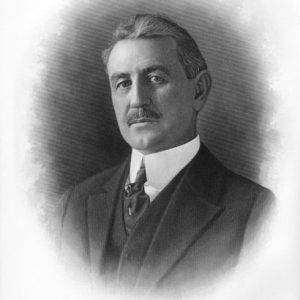calsfoundation@cals.org
Robert Edward Lee Wilson (1865–1933)
Robert Edward Lee Wilson created a plantation empire out of the swamps of Mississippi County in the late nineteenth century, an empire that remains in place today. He was able to fashion his 65,000-acre plantation and lumbering operation by purchasing cut-over land considered worthless by less imaginative men and then draining and developing the swamps. His substantial holdings and creative financing allowed him to weather the economic catastrophe of the 1920s relatively unscathed. By the time the New Deal was implemented in 1933, Lee Wilson & Company was characterized as operating the largest cotton plantation in the South, and its founder enjoyed the kind of political and economic connections that made it possible for him to take best advantage of various early New Deal programs, including a million-dollar Reconstruction Finance Corporation loan.
Lee Wilson was born on a frontier plantation in Mississippi County on March 5, 1865, to Josiah Wilson and Martha Parsons Wilson. He had an older brother and sister and two older half-sisters. His father had been a prosperous, if unpretentious, planter who settled in the densely wooded swamps in 1848 and built his property into a 2,300-acre plantation worked by thirty-nine slaves by 1860. Josiah died without a valid will in 1870, leaving his heirs to fight over a sizeable estate. Wilson inherited 400 acres, which included a greater proportion of wooded swamplands than cultivated acreage. An older brother-in-law served as guardian of his property while young Wilson lived with his mother in Memphis, Tennessee. When his mother died in the yellow fever epidemic of 1878, thirteen-year-old Wilson was briefly entrusted to the care of a paternal uncle but soon returned to Mississippi County to lay claim to his patrimony. In 1882, he went to court to be declared “of age” to transact his own business and began the process of building his plantation enterprise. He married Elizabeth Beall on December 20, 1884; they had four children, three of whom survived to adulthood.
Wilson began to acquire property in the early 1880s and went into partnership with his father-in-law, Socrates Beall, as Wilson & Beall Lumber Company in 1886. As he harvested and sold lumber to markets in St. Louis, Missouri and beyond, he simultaneously began developing his cut-over land for agricultural purposes and engaged in a sustained and controversial effort to drain the swamps. By 1904, he incorporated as Lee Wilson & Company and began organizing his holdings into separate “plantations,” each with its own mercantile establishment and cotton gin. In tune with progressive business strategies, he appointed managers of his various units and required them to report to the head office located at Wilson (Mississippi County). He founded several towns, including one named after his sister Victoria, one named after his youngest daughter, Marie, and one named Armorel (for Arkansas, Missouri, and R. E. Lee), all in Mississippi County. He established a bank in 1908, which opened new credit and capital opportunities to him and helped sustain his enterprises through a series of challenges including floods, droughts, and the Great Depression.
Like many other planters, Wilson employed the sharecropping system, a repressive labor system that led to many abuses. Although Wilson apparently provided better housing and healthcare for his black and white laborers than many, he also faced peonage allegations but encountered no actual legal action. The last years of Wilson’s life were spent in a determined effort to save his agricultural and financial empire from ruin. By aggressively pursuing his business and political connections, he negotiated a million-dollar Reconstruction Finance Corporation loan in mid-1933. An enthusiastic proponent of Franklin Roosevelt’s Agricultural Adjustment Administration, he supported the crop reduction program and secured additional funds that enabled his company to avoid bankruptcy. In 1935, Lee Wilson & Company was the single largest recipient of Agricultural Adjustment Administration funds of any farming operation in the country.
By the time of Wilson’s death on September 27, 1933, he claimed a 65,000-acre plantation worth millions and left his family with a substantial legacy. He left his holdings intact to his heirs, and the company is now run by the fourth generation of Wilsons and continues to exercise considerable economic and political influence.
Wilson had many prominent friends and was on several important boards, including the Arkansas State Highway Commission and the board of trustees of A&M College, now Arkansas State University, where a building was named after him.
For additional information:
Lee Wilson & Company Collection (Unprocessed). Special Collections. University of Arkansas Libraries, Fayetteville, Arkansas.
Whayne, Jeannie. Delta Empire: Lee Wilson and the Transformation of Agriculture in the New South. Baton Rouge: Louisiana State University Press, 2011.
———. “Robert E. Lee Wilson and the Making of a Post Civil War Plantation System.” in The Southern Elite and Social Change: Essays in Honor of Willard B. Gatewood, Jr., edited by Randy Finley and Thomas DeBlack. Fayetteville: University of Arkansas Press, 2002.
Jeannie Whayne
University of Arkansas, Fayetteville
 Agricultural Adjustment Act
Agricultural Adjustment Act Business, Commerce, and Industry
Business, Commerce, and Industry Jonesboro, Lake City and Eastern Railroad
Jonesboro, Lake City and Eastern Railroad Post-Reconstruction through the Gilded Age, 1875 through 1900
Post-Reconstruction through the Gilded Age, 1875 through 1900 Lee Wilson
Lee Wilson 




Comments
No comments on this entry yet.